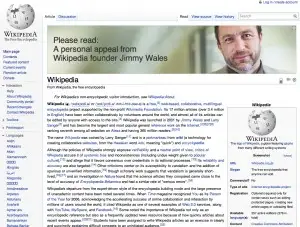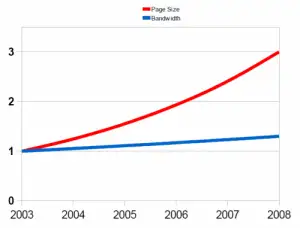Slow website speed and consequences for search costs
There are a number of reason why websites are slow; and the results of this lead to raising searching costs and leaving users. A faster website requires skills and resources often not available to great information-rich pages. With a low-bandwidth connection you have two amin major challenges: A slow connection needs to deal with increasing loaded websites, and low-bandwidth is often what you get with a mobile data connection.
Search costs
Let’s take, for example, Wikipedia’s entry about itself. The page has a file size of 1.54 MB! This means you need to wait 212.52 seconds with a 56kbs modem connection, 82.84 seconds with a 128kb (ISDN) connection and, even with a 1.44Mbps, still 30.57 seconds to see the full page. Imagine the time to browse Wikipedia. Believe it or not a few milliseconds can make a difference, whether we stay on the website or change to a different one. Google found out in a study that the slower their search results appear, the less people search.
“Our experiments demonstrate that slowing down the search results page by 100 to 400 milliseconds has a measurable impact on the number of searches per user of -0.2% to −0.6%.”
Akamai did a similar study on retail websites about speed and expectation of Internet users back in 2009:
“The most compelling results reveal that two seconds is the new threshold in terms of an average online shopper’s expectation for a web page to load and 40 percent of shoppers will wait no more than three seconds before abandoning a retail or travel site.”
So, are we only impatient or do we still have to deal with too many slow websites? Imagine you have a book and you are looking for something, but changing the pages is somehow delayed.
Bandwidth is not keeping pace with page size
The challenge is that bandwidth is not growing in average as fast as the page size. Thanks to web 2.0 in particular, pages are loaded with widgets and many nice features, each tremendously raising the website speed. Alone the facebook "like" button or "fan" box needs more than a 100kb of java script to load. But 100 kb should be the limit for a real lightweight fast website. Aptivate has a good blog about it, with a graph showing that the average page size of websites is growing much higher than the bandwidth.
In the next post I will describe the unequal distribution of bandwidth worldwide and why lightweight pages are important, especially for mobile phone access.

